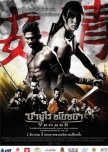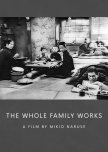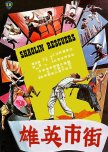
"The friendship given me is like water that nurtures the heart and body"
Muay Thai Warrior aka Yamada: Samurai of Ayothaya was based on the true story of a ronin living in Siam (present day Thailand) who pledged himself to the king and ultimately became a governor. Movie Yamada wasn’t terribly interesting or a very good fighter, the screen only came alive when the Thai boxers showed up.Yamada Nagamasa lives in the Japanese village of Ban Yipon in Ayutthaya. The village is populated with Japanese Christians who fled their homeland and numerous ronin of defeated lords who now work in the king’s Department of Japanese Volunteers. When Yamada discovers that the thieves terrorizing the area are actually Japanese, he’s tasked with tracking down the leader. He’s ambushed by masked assassins and nearly killed. Rescued by a handful of Muay Thai fighters, he’s taken to their village and treated by the monk Phra Khruu. The villagers accept him and he begins to integrate into their lives little by little. Eventually, Phra trains the foreigner in Muay Thai and Yamada proves himself an adept learner. Every pair of elbows and knees will be needed as Ayutthaya may soon be under attack from its lethal enemy. Yamada has the additional concern of Kuroda’s assassins out to end his life.
Ozeki Seigi was nice to look at, but his character and performance were underwhelming. He was also completely unbelievable as a fighter, especially in comparison to the real Thai fighters on screen. They were fast, accurate, fierce, and obviously powerful. Ozeki’s moves were slow and limp. Before you could say, “Wax on, wax off,” Yamada had integrated Thai martial arts with Japanese. Thankfully, professional fighter Buakaw Banchamek, showed up for some spectacular Muay Thai exhibitions.
Ozeki availed himself better with a sword, but then the CGI swords and blood removed any chance of immersing oneself into the fight scenes. I was far more invested in Ketsaro Thanawut’s Khaam. There was a heavy-handed attempt at building a romance between Yamada and Khaam’s sister Jumpaa/Champa which fell flat. And the friendship between Yamada and Khaam was terribly underdeveloped which was the biggest disappointment as they could have been a real highlight of the movie.
Aside from the aggressive training for the king’s bodyguard contest and to be ready for the real threat of the enemy attacking, this movie was blithely uneventful. There were few fight scenes, although the ones shown were for the most part entertaining. Yamada sat around playing his flute often when he wasn’t playing with the children, all to let you know he was a nice guy. Most of the dialogue focused on the right way to die and how important friendship was. The villagers did everything but sit around holding hands and singing Kum Ba Yah. When they weren’t fighting to the death to be royal bodyguards or watching cockfights that is. Overall, I enjoyed Muay Thai Fighter, mostly for the Muay Thai fights. The Thai fighters were a delight to watch. This was a slightly below average martial arts movie and one for fans of the genre to give a try, if you go into it with low expectations.
8 June 2024
Esta resenha foi útil para você?

"Things can only turn out the way they are going to turn out"
The Whole Family Works was a short working poor slice of life film focused on how difficult and soul crushing it can be to find a way out of poverty. Nine children know that when they finish elementary school their only option is to work at the factory or other menial jobs to bring in money to support the family.Ishimura’s family of nine lived day to day with the three oldest boys supplementing the family’s income with meager paying jobs. Though Ishimura’s income had been in steady decline, he sipped sake and smoked while his wife lamented not having enough money to purchase tofu. The eldest child, Kiichi, realized at 22-years-old, that his future was slipping rapidly through his fingers. His dead-end factory job would never pay enough to help his parents as they aged or support a wife and family of his own. He was determined to go to school to train as an electrician to improve his chances of gaining better employment. What does filial piety mean and how much does one have to sacrifice for it? Kiichi weighed his responsibility to his parents and to himself. As he said, he had no great ambitions, “I just want enough to eat.” Ishimura was sympathetic to Kiichi’s concerns, also knowing that if he agreed to let Kiichi leave, the others would want the same freedom. As the one who handled the finances his wife was adamant that Kiichi stay. She had already been “borrowing” from one younger son’s savings and struggled every day to feed the large family.
The numerous brothers could make the film hard to follow. They weren’t always identified well at the beginning. Also, the years have not been kind to the film and it was badly faded and blurred, making it often difficult to tell which son was on screen. As a Naruse film, I have no doubt it looked splendid back in 1939, but many scenes were challenging to make out, especially the night scenes.
The family was in a perilous predicament despite the children being raised right. The kids were good students and hard workers and respectful to their parents. Yet they also had dreams of their own and didn’t want to be trapped in hard labor jobs forever. The parents understood the harsh reality that dreams were more easily achieved with money. Something the family didn’t have. Even if Kiichi succeeded in his potential goals, that success was years away, while food and shelter were needed in the present. Director Naruse Mikio didn’t give away the future, only tinged the unknown with gleeful hope and realistic concern.
7 June 2024
Esta resenha foi útil para você?

"We lived life to the fullest!"
Five of the six Venoms made a return for Shaolin Rescuers. Only Wai Pak was missing. I enjoy the Venom actors, but this movie took too long to gain any traction. It was an hour and fifteen minutes before any real action occurred and that is too long for a kung fu movie. The last forty minutes were entertaining if you can hold on that long.The story begins in familiar territory with the burning of the Shaolin temple and Hong Xi Guan injured and on the run. Gao Jin Zhong (Centipede Venom) and his crew of Manchu fighters are hot on his trail. Hong finds his way to a town that is fraught with danger. Lucky for him, four working class fighters are sympathetic to his cause. Chen A Jin (Toad Venom) is a tofu maker who practices his Mantis Style at work. Yang Da Bao (Lizard Venom) works in a restaurant where anything is a weapon with his training from the Black Tiger Clan. Gao Ji (Scorpion Venom) finds himself on the venomous end of the martial arts school he trains at, learning most of his 49 Big Dipper skills working at the dye factory. Eventually, Han Qi (Venom Apprentice) arrives with his acrobatic troupe. Three of the Venoms care for Hong pooling their meager resources to nurse him back to health. Before long Gao and his men track them down and the five heroes will be in for a fight for their lives.
The major drawback to the story is that for over an hour the Venoms spend most of their time goofing around and fighting each other for fun. It wears thin after the first “comic” fight. When danger strikes, everything picks up as the fights have real stakes. There were a couple of skirmishes with stuntmen and Lu which were faster than most of the other fights. In true Venom form there was a lot of kung fu posing. The last fight was quicker or maybe the editing was better. With the various weapons and fighters, the action felt more exciting. Phillip Kwok and Chiang Sheng were acrobatic as always, playing to their strengths. Sun Chien, a taekwondo artist in real life, brought the kicks. Lo Meng, the “big” guy, was the muscle. He was supposed to use Mantis style but I never saw it. Poor Lu Feng ended up a villain again and was often fighting against Jason Pai Piao as Hong.
Because it was a Chang Cheh movie there was plenty of blood and death. Disappointingly, the story wasn’t very tight. They could have easily cut 20 minutes of hijinks out and gotten down to business. All the smiles and pranks weren’t fooling anyone. Chang Cheh doles out death like a Vegas card dealer and you know better than to get attached to anyone. I have a soft spot for the Venoms so I was willing to impatiently wait until the final lethal confrontation knowing it would be entertaining. It was, but it still didn’t make up for the previous hour.
4 June 2024
Esta resenha foi útil para você?

"Even when you can't see danger, it doesn't mean it's safe"
Separated royal princes, Shaolin Three Stooges, sword fights, kung fu, spirit possession, betrayals, and enough evil laughter for a dozen villains, Shaolin Prince didn’t scrimp on the spectacle. Ti Lung, Derek Yee, Jason Pai Piao, and just about every stuntman working for Shaw Brothers appeared in this film.The royal babies are taken out of the palace by trusted guards when the evil Lord 9th’s men storm it killing everyone. Guard Li Zheng survives repeated onslaughts to take the crown prince to the Shaolin Temple where three “silly monks” who are forbidden from stepping foot outside take the child in to raise him not knowing who he is. Gu Long spirits the younger prince away to the Prime Minister’s home where the good official adopts the boy so that he can keep the child’s identity a secret. The youngest prince, Wang Zi Tai, is trained with the Treasured Sword until he turns twenty. The crown prince, Dao Xing, is trained in high level kung fu by the Three Stooges in a most unorthodox manner. The two brothers coincidentally meet at an exorcism and become friends unaware of their familial connection and common need for revenge.
I’m always up for a Ti Lung kung fu movie because I enjoy his screen presence if not his fighting ability. He was a little long in the tooth at the age of 37 to be playing a 22–23-year-old. Aside from that quibble he seemed to be having a lot of fun playing this light-hearted character trained by the silly monks. Alan Chan Kwok Kuen, Lam Fai Wong, and Yue Tau Wan played the adoptive father monks for Dao Xing. The slapstick could be tiring at times, but when the chips were down, the trio showed they could best anyone who dared to take them on, with their feet never touching the floor. Derek Yee played the more serious, younger prince and acquitted himself well with his sword fighting. The friends to brothers relationship was endearing. And one of my personal favorites, Ku Feng, made a brief appearance as the righteous Prime Minister. Jason Pai Piao had no problem playing the sinister Lord 9th with his literal iron fingers, and weapons decked out sedan chair. Chiang Tao and Yuen Bun brought the fire and water respectively as the Fire General and Water General---because there weren’t enough bonkers characters. I wouldn’t want to exclude the young widow possessed by her demonic dead husband that went on a killing spree. Too much was never too much with this movie!
The fights came often and no two were alike as the gold medal group of martial arts directors went all out to try new styles, weapons, and configurations. Yuen Wah, Yuen Bun, Tang Chia (also the director), Lee Hoi Sang, Kong Chuen, and Huang Pei Chih managed to choreograph fights that looked like they belonged to the same movie while not being repetitious. Too often when there are several choreographers, the fights can seem disjointed. A plethora of actor-stuntmen filled out the cast for all of the extravaganza fights at the palace and temple.
Shaolin Prince may not have been a quality movie, but for a martial arts flick with humor and a high body count, it was entertaining. I’m happy that it has been restored and taken care of as so many other old kung fu flicks are fading with time. The most valuable kung fu advice from this film, “Continue if you can, hide if you can’t!” or equally helpful, the “Run for Your Life!” style. If you enjoy Shaw Brothers movies this is one to give a try.
31 May 2024
Esta resenha foi útil para você?

"Success requires sacrifice"
Yue Song wrote, directed, and starred in Super Bodyguard aka Iron Protector. The clichés and migraine inducing editing were saved in the last act with some mind-boggling fights. If the outtakes at the end of the movie were any indication, plenty of real blood flowed as well.Wu Lin and Jiang Li were trained as children by their sifu until Jiang Li dabbled in crime and was kicked out before he learned the secret 108 Iron Kicks. Jiang Li joined a crime syndicate while Wu Lin faithfully trained, even wearing 50 kg/110 lbs worth of iron boots for ten years. After their sifu died, Wu Lin went to work for Jiang Li serving as a bodyguard to a spoiled, rich, young woman. When kidnappers came calling Wu Lin would stop at nothing to rescue Fei Fei, even if it meant confronting his friend and his painful past.
Yue Song was hard to take seriously with his terrible mullet and big stomping shoes. Becky Li had the thankless role of the annoying Fei Fei. How many times have we seen this overused rich girl stereotype? And that’s what was really the problem with this film. Nothing was new and I have seen it done better in other movies. The clichés were served up one after the other. Even the big twist at the end was no surprise. The shaky quick editing showing closeups of body parts, tigers, bad guys, good guys, etc. was dizzying. Yue also used comic book coloring and editing for certain scenes. Perhaps Yue was trying to be artistic with the back and forth editing combined with flash backs or maybe he was trying to make a mundane story interesting.
The fights made copious use of wire work as Wu Lin flew through car windows and people were thrown about as though weightless until they doubled their mass when they crashed through whatever wall or unlucky prop or stuntman lay beneath them. The final fight, while unbelievable, was highly entertaining when Wu Lin finally got his mojo going after he cut his mullet. Coincidence? I think not.
Campy, with a wildly ridiculous plot, and highly questionable editing choices, Iron Bodyguard still had entertaining moments and Yue Song made for a likeable hero with his stomping iron boots and iron fists. He was as impervious to injury and death as a Kdrama serial killer. I always enjoy seeing Xing Yu strut his kung fu stuff, even when his character couldn’t figure out what his motivation was. Between Yue’s mullet, the overused story elements, '80s kung fu movie bad guy Michael Chan as the villain, not to mention Yue's T.J. Hooker style of clinging to a racing vehicle, this movie would have felt at home in the late 1980’s. I probably would have rated it higher had it been filmed in the 80’s on my old kung fu movie curve. No points for nostalgia.
30 May 2024
Esta resenha foi útil para você?

Low budget trip to Thailand
Snapshot was another short film by director Kim Chang Gyun. Shot on a shoestring budget, Kim took his small crew to Thailand to film a trio of people on vacation. Given that Kim was the producer, director, writer, director of photography, actor, and editor, it’s best to go into this short with low expectations and enjoy the stunning scenery.Hyeong Wu and his girlfriend, Da Eun, are in Thailand for a working vacation. Hyeong is planning on opening a Thai restaurant so that he can stop working late nights at his bar. They visit Ayutthaya and see the remarkable ruins before traveling to Chiang Mai for the Sunday Market. They chat about life and children in a stilted and awkward conversation as Da Eun tries not to get in an argument. The next day he doesn’t feel well and Da Eun goes to ride and feed the elephants. She meets fellow Korean Se Jin there. They sightsee and talk hitting it off well. Da Eun is concerned about the age gap between her and her boyfriend and that he may have grown older but didn’t mature. When Hyeong and Da Eun travel to Pattaya it’s her turn to fall ill and he goes out by himself. He also meets Se Jin and strikes up a conversation conveniently forgetting he has a girlfriend.
Kim Chang Gyun enjoys having his characters sit and chat for long minutes. As in life, the conversations were often mundane and revealing. The couple came to understand that they wanted different things while attempting to sweep the differences under the rug. Se Jin and Hyeong had even more awkward conversations as he seemed to be intimating that he was interested in her while she treated him more as an older acquaintance. Of course, everyone will be waiting for Hyeong’s two worlds to collide and for him to get his comeuppance. Truthfully, I was far more invested in the women's new friendship then the romantic relationship.
As in Cine Café in Paris, one of the women was a photographer and the other was an out of work actress. This time Kim Chang Gyun played a cad who excused his behavior because a woman was beautiful. Also, as he did as a director in Paris, he showed numerous highlights of the foreign place he was filming in. The couples took us along for their sightseeing tours which I quite enjoyed.
Snapshot was a snapshot of three people’s lives as they became entangled on vacation in scenic Thailand. For a very low budget, short film, it was entertaining. I’m more lenient with these cheap, niche films. The only thing that prevented this from being a 7 for me was the omission of the women comparing notes, which after viewing these characters would have been the most fun scene of all.
29 May 2024
Esta resenha foi útil para você?

Tell me what you dream at night...
Time Renegades was an entertaining if flawed movie. Two men 32 years apart share memories during their dreams after each had a near death experience.This film had a strong cast which helped gloss over some of the bigger plot holes. I liked the premise of the story even if it was used erratically. A school teacher in 1983 tried to stop a serial killer using knowledge from a detective in 2015. Geon Woo, the detective, researched past murders which didn’t do much for the present but helped Ji Hwan in the past. Only one character attempted to use Geon Woo’s connection in a more direct manner, something I thought Geon Woo would do. There were a couple of serious lapses in logic and continuity for dramatic effect. One moment which I’m sure was meant to be melodramatically devastating actually made me laugh at its obviousness and relatively low stakes.
The film was strongest in the past, largely due to Jo Jung Suk’s performance as the grieving teacher determined to alter the deadly course of events set in motion. Ji Hwan’s love for the children and desire to avenge a death made for great motivation. Geon Woo’s romantic entanglement with So Eun felt less well developed. While there was no physical time traveling, the consciousness of the men traveled as needed. The ending was the type that I like the least in this genre and one that makes the least sense to me.
Despite my reservations, I enjoyed this film as the two men tried to undo the tragedies of the past and the echoes of death and despair in the present. The film maintained a consistent stream of action so that it was never boring. Some of the performances were better than others. The Teflon villain became almost comical as he survived endless attempts to stop or at least slow him down. The movie’s solution was novel and felt like a nod to Back to the Future, if a more deadly nod. Time Renegades may not have been a dream come true, but this dream weaver was engrossing if not thrilling.
28 May 2024
Esta resenha foi útil para você?

Confusing but Nakadai Tatsuya made it worthwhile viewing
If you don’t know the story around Shadow Hunters and the main characters this special can be confusing to watch. I had to go back and rewatch the first quarter to see if I’d just missed characters’ names and titles being introduced. Nope. Old pop culture reference alert---at least if you watch Bonanza someone will call Little Joe by his name or Hoss by his. Only a few characters received names and the plot was thin. Nakadai Tatsuya carried this show on his back.While at the Yoshino Inn, the five-year-old lord of the Takashima clan is attacked as he sleeps by a ninja. He’s been ordered to Edo to perform the sankin-kotai. Wounded or not, he has to be in Edo in three days or the clan will be annihilated. The evil Oba has sent ninjas and other assassins to stop the child from arriving. Three ronin known as Shadow Hunters decide to make sure the young lord Tadamura makes it to Edo. They will face danger every step along the way as they escort three samurai carrying a box containing Tadamura on their shoulders.
The Shadow Hunters were led by Nakadai Tatsuya and his wildly expressive eyes. He was joined by Ito Binpachi and Ryu Daisuke. Three scruffier ronin would be hard to find. Jubei (Nakadai) was also hunted by the daughter of a man he had killed five years ago. Most of the sword fights were swipe and fall with shiny clean swords. There were some exciting fights on horseback. Japanese tv was more lenient than my country in 1983. There were bare breasts and also children being murdered if either of those things are deal breakers for you.
Jubei's fellow Shadow Hunters were never named in this special although in the manga they were called Sunlight and Moonlight instead of basically "hey you 1 and and hey you 2". It was well into the movie before Oba’s name was brought up and why Jubei despised him. The woman stalking his every movement looking for a chance to kill him also received a name late in the movie---Chiaki. Other characters were never explained. For those like me, who had no idea what sankin-kotai is, it was the process of daimyos living part of the time in Edo so that the shogun’s men could keep an eye on them. By having to maintain two households and pay for traveling back and forth, it cut into their finances, thereby keeping them weaker. Why the young lord being murdered by a jealous rival or even the shogun himself, would cause the annihilation of the clan is beyond my understanding. Greedy lords or a greedy shogun hoped to access their wealth and reduce threats, but it didn’t seem like a way to engender peaceful cooperation. What do I know? A shattered vase could also cause a clan’s demise. Falls under he who has the gold makes the rules. Although the ones under threat also found a creative use for gold.
Despite the confusing and incomplete way the story was told, the three ronin were compelling to watch because of the actors playing them. Nakadai Tatsuya commanded the screen whenever he was on it. If you are familiar with the source material going into it or patient enough to follow the story until it begins to make more sense, there are entertaining moments to be had in Shadow Hunters.
24 May 2024
Esta resenha foi útil para você?

Quick, low budget trip to Paris
Two actresses, a director, and a member of a film crew all converge in Paris, France for the lighthearted film, Cine Café in Paris. This was a low budget film with Kim Changgyun wearing the hats of actor, director, writer, producer, director of photography, and editor. Whew! It felt like a family affair as everyone in the small cast with the exception of one was a Kim. This was a nice travelogue of Paris and also an “inside baseball” look at filming abroad.Hara and Eun Su are two actress friends vacationing in the City of Lights. Hara is getting over a failed relationship and audition. The two women take in the sights and discuss boyfriends and life. All is going well until Hara accidentally loses Eun Su’s beloved camera. About that time Director Shin and Mr. Lee make their acquaintance and the four seem to run into each other continually in the quaint little town of Paris where throngs of crowds are unknown. Lol
Hara and Eun Su approach the tourist sights differently. Eun Su takes pictures of art and the buildings around her, while Hara focuses on selfies. Both are dedicated to being actresses though they don’t seem to have much success yet. Shin and Lee discuss the difficulties of filming abroad as they scout locations for his next film. When Shin tells Lee that the production company has to field all of the complaints of the crew and cast, even about the food that’s served, Lee responds Mr. Kim handles all that. A nod of course to the director of this film.
There were times this movie felt like it was filmed with a cell phone, and with a low budget, it might have been. There were only a few scenes where music was inserted and it came across like old silent films because there was no dialogue when the music played. There were also placards introducing each new chapter with the setup for that part of the story, much like silent films as well.
If you want to see the main sights of Paris, this film touched briefly on them. The Louvre, Eiffel Tower, Notre Dame (pre-fire), Montmartre, a cruise down the Seine, and other familiar places were shown. The director commented in the movie that filming near these tourist attractions required permission and that there wasn’t much one could do about the large crowds, so it appeared they tried to work around those limitations in real life.
Cine Café in Paris wasn’t a great film, and it did start out too slow and self-conscious for me, but as the women worked through their problems and the men joined in with the discussions it became more engaging. Director Shin actually answered some of the questions I had about filming in Paris during his conversations with Lee. At around an hour, it didn’t require a huge time commitment to pop over to Paris and enjoy some of the sights and see how the four people overcame their personal and professional challenges.
22 May 2024
Esta resenha foi útil para você?

"Times change, so do we"
Juhan Shuttai turned Vibes’ publishing world on its head with the addition of a force of nature to a manga editing department in the form of Kurasawa Kokoro, a former judo star. Surrounded by men day and night, Kokoro used her training to learn the ropes and forge professional relationships with the oddball crew of writers and editors.After an injury causes Kurosawa Kokoro’s judo career to end she decides to work in manga editing. Twenty interviews later she lands a job at the manga magazine Vibes, the #2 magazine. Before long she is training with the rational Iokibe and butting heads with the cynical Yasui. She meets a successful senior manga creator who is struggling with his artwork and an eccentric hat wearing writer whose volatile love life threatens deadlines. Kokoro cheerfully helps to come up with solutions to the deadline and creative problems. Her mantra is always “Do your best!” Now she needs to develop her own writers and fulfill her desire to publish a sleeper hit.
This was a strange world where most women, aside from Kokoro and a couple of others, lived on the periphery. Most of the work was about the men. Kokoro seemed to be hired because she was an unorthodox woman. In real life she would be exhausting to be around. She stayed aerobically fit by running, always taking the stairs and talking so loudly, so enthusiastically, and so fast she often gasped for air. She lived in a world inhabited by mostly men. I come from a place where the majority of publishing editors are women so seeing the editing and sales departments with zero women except for Kokoro was staggering. Management was entirely male. Only one of the ten manga writers was a woman which was interesting given that 66-70% of mangaka are female. And the sole female artist was repeatedly said to have “hangups” and was only there to be taken advantage of. None of the eight manga assistants were women. The invisibility of women made it all the more visible they weren’t there when they should have been, at least as artists.
Juhan Shuttai discussed the changing environment for mangas, how e-books and closing bookstores affected the business. Lower sales caused the bottom line to be critical for the triumvirate of manga artists, publishers, and booksellers to all stay in the black. The editors and booksellers fought to keep manga relevant and selling in an ever changing market.
The problems that arose weren’t earth shattering and usually had simple solutions that fixed everything. This was a joyful, carefree watch where good actions and positive thinking were stressed. Luck could be accrued by acts of kindness and most characters learned lessons about life and happiness. If you are down and need something encouraging this would be a good choice. Despite me wanting to find the volume button to turn down Kokoro’s unrelenting enthusiasm at times, it was a nice “pick me up” drama to watch.
12 May 2024
(7.75)
Esta resenha foi útil para você?

"I became a gangster because of a chicken leg"
Director Doze Niu set Monga in the 1980’s replete with terrible hairstyles and requisite Air Supply music. The five boys of the Gang of Princes had enough daddy issues to ask for a group rate at their local therapist’s office. The boys also dealt with the daily violence on the streets, betrayals, death, and unrequited love.Mosquito’s father died after he was born and he’s been bullied everywhere he and his mother have lived. The bullying begins again at his new school over the chicken leg in his lunch. After school, Dog Boy and his crew jump Mosquito but the new kid acquits himself well and the real power gang led by Dragon Lee and Monk take notice and take Mosquito under their wing. While Dragon Lee is the leader due to his dad’s gang status, Monk, his second in command, provides the muscle and the brains. The boys become sworn brothers and spend more time together hanging out than in school. Life can be precarious on the streets as the brotherhood find out after a deadly mistake has repercussions, a secret touches the wrong ears, and a new player comes to town unafraid to shake up the old way of doing business.
Triads, gangs, and boys’ gangs have all been done. Doze put his own Taiwanese flair on Monga. The crowded, brightly lit streets deserved their own screen credits. The scenes were as loud and chaotic as the story. While there were plenty of fights, they often came across more balletic, especially with the soothing music playing in the background and slow-motion shots. Monk and Mosquito were the focus of the main plot and subplots. Monk’s feelings for Dragon Lee ran far deeper than brotherhood. He protected Dragon Lee from his own worst inclinations and took the punishment for his actions from Dragon’s gang boss dad. Monk also had his own aspirations and deeply held resentments. Mosquito was the innocent one of the crew. He was looking for family, for brothers, for connection---for a father. Much of the narration was told through his naïve eyes. Perhaps to bring a feminine element into the film or to give Mosquito a soft shoulder to lie on, Ning, a prostitute was introduced. Around the same age, the two fell into a tender friendship, limited by her contract at the brothel. Doze played the Mainland triad leader determined to take over Monga and who also had a connection to Mosquito and his mom.
Mark Chao in his film debut provided the character who could show horror and fear when called upon for the audience. At times a little stiff, but overall, a good first film performance. Ethan Juan was both mesmerizing and terrifying as Monk. With good reason he won the Golden Horse Award for Best Leading Actor for his primal portrayal of the young gangster. Rhydian Vaughan didn’t have as much to do, although he was saddled with the worst mullet outside of a redneck truck stop in 1980’s Texas. The veteran cast gave the proper gravitas to the criminal adults in the room.
The first half of the frenetic movie was all about bonding and hanging out, and navigating the different groups and their territories. When there was no turning back, the shift in tone was cataclysmic and there was no denying that blood would be shed, and vows would be broken. When war came to Monga, no one was ready for the consequences, not even those who thought they were above it. Blood would flow like cherry blossoms.
10 May 2024
Esta resenha foi útil para você?

Didn't blow me away
Police Story 2 brought back much of the cast from Police Story, including the divine Maggie Cheung. Even with two different sets of bad guys and some pyrotechnics, the story dragged badly in comparison to the first and third movies of the series.Chan Ka Kui finds himself demoted to traffic cop after the destructive events of the first film. To make matters worse Chu Tao is given a compassionate care release. Chu's assistant Koo and his henchmen harass both Chan and May repeatedly. After a run in with the baddies in a restaurant and a children’s playground, Chan is called on the carpet by his bosses. This time he’s had enough and resigns. He no more than turns his badge in when blackmailing bombers threaten a company by blowing up one of their malls. His superiors talk him into coming back to work and he joins an elite surveillance team to track down the evil doers.
PS2 struggled with its identity. The murderous bad guys from the previous film were played up for comic effect in this one. Honestly, most of the scenes committed to Charlie Cho’s Koo felt more like padding and did nothing to drive the narrative forward. At 2 hours, the movie was already bloated for a 1980’s action flick. While there were a couple of good fights as was expected from a Jackie Chan movie, there wasn't the same excitement as in PS1 and 3. Given the outtakes, several people were hurt including Maggie Cheung. She endured a serious head injury, serious enough she couldn’t finish the film which was obvious because after the stunt you never see her face again. Much of Chan’s stunts in the last thirty minutes involved being set on fire. There were two impressive explosions but buildings blowing up don’t make up for terrible pacing and lackluster storytelling.
There were several interesting guest appearances. Wu Ma showed up as a mall cop. Lau Ching Wan made a brief showing as a CID officer. Charlie Cho’s main reason for being in the film seemed to be for the comic effect of having his glasses invariably broken in all of his scenes, a running gag from the first movie. Benny Lai was one of the official stuntmen from Jackie’s company and provided a sound final opponent for Chan even if his deaf-mute character pushed the limits of poor taste. Mitsubishi trucks and Canon cameras had more scenes than most of the supporting actors. Full moon alert---some of the bit players appeared to have been hired for their tight butts for a comic scene when May chased Chan through the men’s police showers.
While there were entertaining fights and moments, especially in the last thirty minutes, Police Story 2 bogged down for much of the other ninety minutes going back and forth trying to decide if Chan was a loose, reckless canon or a hero. I’m sure many Jackie Chan fans will find this film a blast. But for me, instead of a thrilling, explosive story, the bouncing around of villains and bland dialogue caused the movie to fizzle.
4 May 2024
Esta resenha foi útil para você?

Jeon Woo Chi: O Feiticeiro Taoista
2 pessoas acharam esta resenha útil
"The world has changed." "But people don't change"
Jeon Woo Chi: The Taoist Wizard was an uneven but entertaining movie about a mischievous Taoist sorcerer who battled monsters in 16th century Korea and 500 years later. A magical flute that can control the monsters was at the center of a battle between good and evil as Woo Chi and his trusty sidekick Cho Rang Yi attempted to put the monsters back in their gourds.Woo Chi enjoys bringing attention to himself even when he’s doing it for a good cause and also likes tweaking the noses of the rich and powerful. Armed with magical talismans he performs amazing tricks all of which are frowned upon by his master and sidekick. Rang Yi appears human but in actuality is a dog who can also take the form of a horse. One night Woo Chi crosses paths with another Taoist master, Hwa Dam, and three bumbling shinsuns. These shinsuns are the immortals who accidentally released monsters imprisoned in a heavenly realm by losing track of time while Pyohundaeduck played his magical flute keeping them under control. When the monsters escaped, the flute was contaminated with evil spirits. Both it and Pyohundaeduck fell to earth. The flautist lost his memory and disappeared. Hwa Dam and the shinsuns are searching for the flute. Woo Chi in on the hunt for a bronze sword that will help him become more powerful. After Woo Chi’s master is murdered Hwa Dam and the shinsuns blame Woo Chi and lock him into a painting along with Rang Yi and half of the broken flute. 500 years later the shinsuns release Woo Chi when Hwa Dam is unavailable to fight two dangerous escaped monsters.
Kang Don Won was entertaining as the cocky sorcerer, without his charisma this film would have fallen flat. Yoo Hae Jin is a pleasure to watch and always brings his all to every role even when playing animals. Kim Yoon Seok gave a delightful menace to Hwa Dam. And three competent character actors took on the Three Stooges of heavenly beings. Despite being the FL, Lim Soo Jung wasn’t given much to do until the end.
There was plenty of action both magical and down and dirty fighting between Woo Chi and the monstrous rat and rabbit and their human forms. Wire work abounded and Woo Chi sustained hits even a sorcerer shouldn’t have gotten up from. The CGI was rudimentary more often than not, even for 2009. I didn’t have a big problem with the mediocre CGI but I did have a problem with the editing and lapses in narrative. Some of the story was needlessly confusing and contrived. The actors and action managed to smooth over the ragged seams most of the time.
Though a romance was awkwardly inserted, it didn’t work well for me. This was more a story of a sorcerer and his dog. While Jeon Woo Chi was a lighthearted magical romp, its failure to tie several narrative elements together kept it from casting a spell over me.
3 May 2024
(7.25)
Esta resenha foi útil para você?

"I may be a bad man but I can be sincere"
Walk Cheerfully was the second of Ozu Yasujiro’s crime films from the 1930’s. Before he endlessly contemplated how modernization affected the traditional family, he directed this film about a gangster who fell in love with a good woman and turned his life upside-down.Kenji the Knife and his crime buddy Senko work together to steal wallets and blackmail people. Kenji is involved with a hard-hearted dame named Chieko. One day he sees a beautiful woman picking up a diamond ring in a store. As fate would have it afterwards, he almost literally runs into her and her sister in his car and gives them a lift. From then on he is completely smitten with Yasue while his friends think he is playing her for her money. Yasue has her own problems at work as a typist due to a pervy boss who thinks she would jump at the chance to be with him. Her mother advises against her quitting as she is the sole breadwinner in their little family. Kenji and Yasue begin to see each other until Chieko tells her what he does for a living. Kenji has to decide if he loves Yasue enough to go the straight and narrow for her.
This early Ozu film would be hard to peg as one of his. The simplest reason was that he was not the screenwriter for this film as he was for his more famous films. His directorial style was unlike his post WWII films, too. There was a great deal of movement as he hadn’t solidified his filming from the mat style. He was still in his filming feet stage as there were at least three scenes with people’s shoes. While each frame was well composed the sets reflected Kenji’s grittier lifestyle in lieu of the picturesque compositions he would use later. People talked more naturally instead of staring head on toward the camera. There were still the geometrically inspired shots and loving attention to everyday objects. This film had a light comedic touch often shown through the gangsters walking and dancing in sync.
I enjoyed this film more than Dragnet Girl which revolved around a gangster falling in love with a good traditional woman, too. Like that film, Yasue wore traditional clothes and the gangster moll wore western attire. Takada Minoru was suave as the gangster wooing Kawasaki Hiroko’s Yasue. Yoshitani Hisao as Kenji’s friend Senko had a comfortable chemistry with Takada. The buddies supported each other in their life new goals while a third crime partner as well as the moll couldn’t let go of the criminal way of life or Kenji. Sakamoto Takeshi who appeared in several Ozu films through the years portrayed Yasue’s lecherous boss.
For a silent film, Walk Cheerfully was an easy watch as the story was straightforward. A bad boy falls in love with a good girl. He changes his way of life for her and must decide when things get tough whether to fall back into his old ways. The intertitles made the story comprehensible and the actors gave thoughtful performances that clearly showed their emotions without overacting. While there were a few slow areas, overall the film was an enjoyable watch.
28 April 2024
Esta resenha foi útil para você?

"Big stories, like life, get out of control"
Gone with the Bullets was loosely inspired by the real-life events that led to China’s first film. I say loosely because very little in this film was realistic from the opium induced car ride in the sky to the cartoon reenactments of a supposed crime scene. A kaleidoscope of primary colors doused the screen in a variety of manners. The realistic elements were the dangers of the court of public opinion and how films could be utilized for propaganda.Ma Zouri is a fixer and a con artist extraordinaire. When the 7th son of the local warlord comes to him for help, Ma smells an easy mark. He and his partner, Xiang Feitian, decide to use Wu Qi’s money to hold the largest courtesan contest in the world, open to all ladies of the evening. The pageant is shared over the radio and filmed by the warlord’s 6th child, Wu Liu. The beautiful Yin Wanyan, and Ma’s lover, wins after promising 30 men she will entertain them and let them discover her “virginity.” The newly crowned President asks Ma to marry her which he refuses. They go on an opium induced car ride after making up. The next morning Ma wakes to find the car turned over and Wanyan dead. He runs to Wu Liu for help as he’s wanted for murder. During his two years on the run, he discovers there is a lurid play based on Wanyan’s death with audience participation.
"When the fake becomes real the real often becomes fake"
The film opened to music from 2001: A Space Odyssey, quotes from Shakespeare’s Hamlet, and an homage to the Godfather. It didn’t stop there. Numerous movies, events and songs were used regardless of time and circumstance. One contestant sang Summertime by Gershwin which wouldn’t be written for another decade when it was used in Porgy and Bess. The ode to motherhood also looked suspiciously like something out of 42nd Street. Reality and memory blended at times making it hard to tell what was real.
"We have to go fast to be nowhere"
Director Jiang Wen also starred as Ma Zouri with the capable Ge You as the duplicitous Xiang. An ethereal Shu Qi brought Wanyan to life and Jiang’s wife, Zhou Yun, was marvelous as Wu-6th aka Wu Liu. No expense was spared on the opulent sets and luxurious costumes. The talent portion of the contest was filmed on a huge stage with numerous scantily clad dancers in well choreographed dance numbers. I was surprised to see so much skin and gratuitous crotch shots in a Chinese film. Even more surprised in a fan dance number filmed from above where the dancers’ fans provocatively looked like vaginas. There were also poop jokes, self pleasuring, and a prisoner threatened with being “hammered” by a horse.
“The audience is always right.”
The story wasn’t always cohesive in this allegory or spoof of the movie industry and lawless land governed by corrupt foreign entities and warlords. “Love is nice but violence makes money!” Theater reenactments of the crime honed in on the violence the audience wanted to watch. After seeing the performances their minds were made up to Ma’s guilt. No trial, no witnesses, no evidence, only the court of public opinion for what would be the final show to be filmed by Wu Liu. And those in power saw no reason to not give the people what they wanted if it benefited them. Reality is easily manipulated on film in Jiang’s wink to propaganda. Gone with the Wind, I mean Bullets, was a strange but entertaining film that focused on one man’s downfall precipitated by his own hubris and also, “no good deed goes unpunished.”
18 April 2024
Esta resenha foi útil para você?

 55
55 223
223 11
11






















